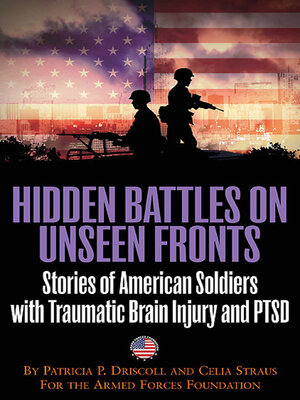Hidden Battles on Unseen Fronts
ebook ∣ Stories of American Soldiers with Traumatic Brain Injury and PTSD
By Patricia P. Driscoll

Sign up to save your library
With an OverDrive account, you can save your favorite libraries for at-a-glance information about availability. Find out more about OverDrive accounts.
Find this title in Libby, the library reading app by OverDrive.



Search for a digital library with this title
Title found at these libraries:
| Library Name | Distance |
|---|---|
| Loading... |
Veterans’ stories of PTSD and TBI anchor this “invaluable volume . . . another important cry for the proper treatment of the nation’s defenders” (Publishers Weekly).
In the twenty-first century, the US military has vastly improved its combat medical and medevac capabilities. But even as more soldiers survive the thick of combat, they are returning home with invisible wounds that go tragically untreated. Hidden Battles on Unseen Fronts details the ever-increasing documented cases of physical or mental brain trauma among veterans. The authors share the “harrowing, inspiring stories” of soldiers who came home from Iraq or Afghanistan with life-altering injuries to the brain and psyche, along with their equally dramatic stories of recovery (Publishers Weekly).
The chapters are developed from interviews with troops and their family members, and supported with essays by mental health professionals, veterans’ advocates, and members of Veterans Affairs and the Department of Defense, all of whom are working on the front lines of this national health crisis.
All royalties from this work will go directly to the front line of support for wounded warriors with PTSD and TBI and their families.
In the twenty-first century, the US military has vastly improved its combat medical and medevac capabilities. But even as more soldiers survive the thick of combat, they are returning home with invisible wounds that go tragically untreated. Hidden Battles on Unseen Fronts details the ever-increasing documented cases of physical or mental brain trauma among veterans. The authors share the “harrowing, inspiring stories” of soldiers who came home from Iraq or Afghanistan with life-altering injuries to the brain and psyche, along with their equally dramatic stories of recovery (Publishers Weekly).
The chapters are developed from interviews with troops and their family members, and supported with essays by mental health professionals, veterans’ advocates, and members of Veterans Affairs and the Department of Defense, all of whom are working on the front lines of this national health crisis.
All royalties from this work will go directly to the front line of support for wounded warriors with PTSD and TBI and their families.







